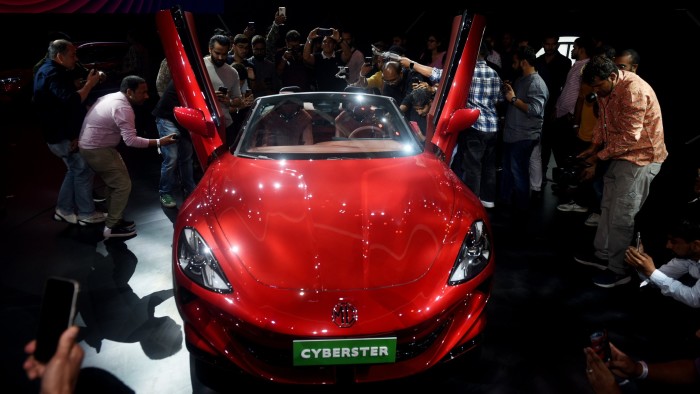Unlock the Editor’s Digest for free
Roula Khalaf, Editor of the FT, selects her favourite stories in this weekly newsletter.
JSW plans to launch its own electric vehicles brand, its chair and family owner Sajjan Jindal has said, signalling a move by the Indian steelmaker to become a significant player in the country’s growing EV sector.
JSW’s plans for its own in-house EV brand follow its announcement in March of a $1.5bn joint venture with SAIC Motor to build and sell the Chinese carmaker’s MG-brand EVs in the world’s most populous country and third-largest car market.
In an interview with the Financial Times, Jindal said JSW’s planned car plant in Aurangabad in India’s western Maharashtra state would be devoted to its own brand, revealing for the first time an aim to build vehicles under its own name.
“Our idea is not to be an outpost of a Chinese company to sell products in India,” Jindal told the FT. “We want to manufacture the products in India, value-add in India and sell in India.”
In launching its own brand, JSW would be entering a field of EV makers in India that includes Tata Motors, Mahindra and Ola Electric.
Jindal gave no further details of his group’s plans for investment or the specific vehicles to be produced. However, in a post on X in October Aurangabad Industrial City, an industrial park in Maharashtra, welcomed JSW for what it said would be a Rs272bn ($3.2bn) investment set to make EVs and commercial vehicles and create 5,200 jobs.
While sales of battery-powered two-wheel vehicles have soared in India in recent years with the help of subsidies, demand for full-size EVs has developed more slowly.
This contrasts with India’s arch-rival China, where government subsidies and incentives for producers and buyers have prompted mass uptake.
Electric car sales in India total only about 100,000 units a year, accounting for about 2 per cent of the passenger car market, according to S&P Global Mobility, but sales are starting to take off among more affluent Indians.
MG Motor India in September launched its Windsor crossover EV, priced at about $17,000. According to the company the model is “fully booked” for the next few months, with sales capped at 50,000 this year because its plant in Gujarat does not have capacity to produce more.
Narendra Modi’s government last year vetoed a proposal by China’s BYD, which is vying with Tesla to become the world’s top-selling EV brand, to set up a plant in Hyderabad in a JV with local company Megha Engineering. BYD recently set up a partnership in neighbouring Pakistan, where it aims to make EVs by 2026.
Modi’s government in 2020 enforced some of Asia’s strictest curbs on Chinese investment against the backdrop of fatal border clashes in the Himalayas, forcing companies from neighbouring countries to secure government approval to invest.
SAIC entered the JV with JSW after finding that cash for its operation in India was “not coming through” because of government controls, Jindal said. SAIC did not respond to a request for comment.
Separately, Jindal described an expected US-China decoupling under Donald Trump’s incoming administration as “a great opportunity for India” because the US would be “friendly” towards it, even as he raises tariffs on goods from China and other countries.
“If you see the way Mr Trump is thinking, Europe is going to suffer in a way, China will also suffer, and the countries that will benefit — the large countries — one is Japan, and the second would be India,” Jindal said.
“There will be tariffs in the US, even for Indian companies,” he said. “But still the US would be friendly towards India — that is what I believe.”
Read the full article here




